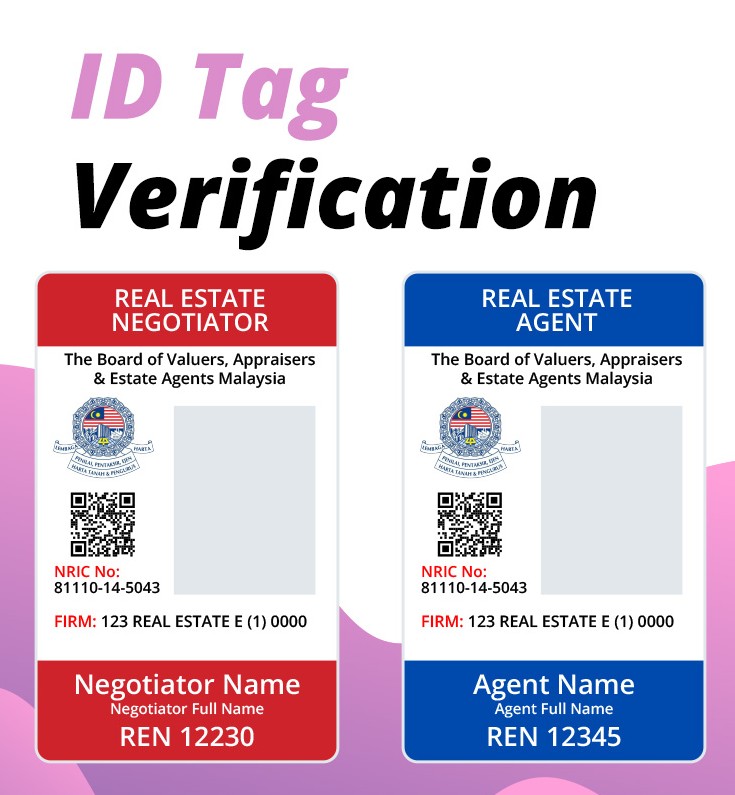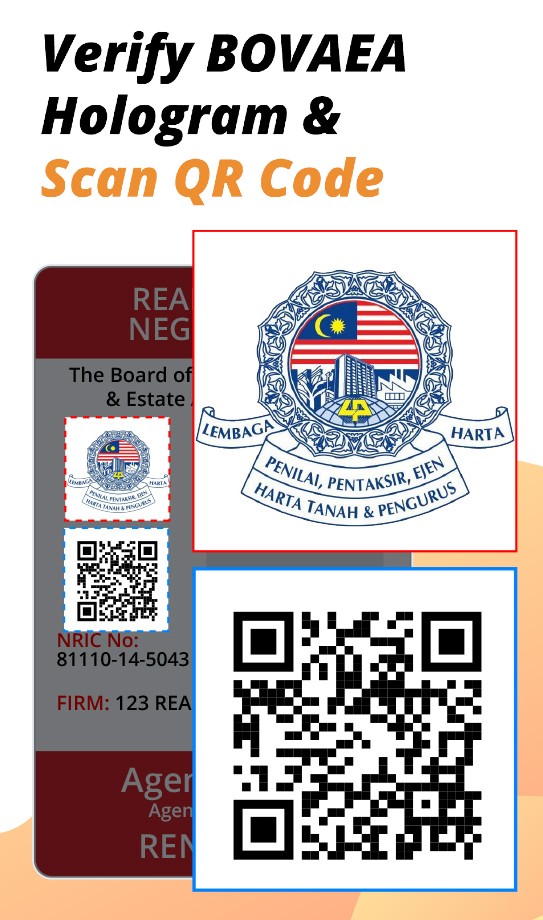![]()

How to Check if a Malaysian Real Estate Agent is Real: Your Authoritative 5-Step Guide for 2025
Why should you read this guide?
Buying, selling, or renting a property is one of the biggest financial decisions you will make. To protect you from fraud and ensure your transaction is safe, Malaysia has a strict legal framework for the real estate industry. The main law is the Valuers, Appraisers, Estate Agents and Property Managers Act 1981 (Act 242). This law created an official body called the Board of Valuers, Appraisers, Estate Agents and Property Managers (BOVAEP), also known as LPPEH. Operating under the Ministry of Finance, BOVAEP is the only government body that can issue licenses to real estate agents and negotiators in Malaysia. Its job is to protect the public by making sure all agents are qualified, professional, and follow a strict code of ethics.
Unfortunately, fraud is a real and present danger. Fake property agents have scammed nearly 1,500 people out of almost RM60 million in the last five years. BOVAEP receives about 50 to 60 complaints every month about these illegal agents, showing that this is a constant threat. These are not just statistics; they represent families who have lost their life savings and their dreams.
This guide gives you a simple but powerful 5-step checklist to verify any agent you meet. Following these steps will help you avoid scams, protect your money, and ensure you are working with a true, accountable professional.
The 5 Essential Checks
- Check Online First: Before anything else, search for the agent on the official portal: https://lpeph.gov.my/search-listing. If they are not listed, they are not legal.
- Inspect the ID Tag: A real agent must have an official ID tag (Red for REN, Blue for REA) with a hologram and a QR code. Scan the QR code to verify their profile instantly.
- Know the Difference (REA vs. REN): A Real Estate Agent (REA) is a licensed professional who can own an agency. A Real Estate Negotiator (REN) is certified but must work for an REA’s firm.
- Pay the Right Account: NEVER pay into a personal bank account. All deposits must go to the real estate agency’s official Client Account.
- Spot the Red Flags: Be wary of high-pressure tactics, deals that are too good to be true, and any refusal to show credentials.
Check #1: How do I check an agent's license online?
The fastest and most reliable way to check if an agent is legitimate is by using the official BOVAEP/LPPEH online search portal. This is the official government database of all licensed real estate professionals in Malaysia. If a person’s name is not in this database, they are not legally allowed to work as an agent. This should always be your first check.
How do I use the official search website?
Scammers sometimes create fake websites that look real, so it’s very important to use the correct link.
The Official Website: The only official search portal for the public is https://lpeph.gov.my/search-listing . Always type this address directly into your browser or use a trusted link.
Step-by-Step Guide to Check an Agent:
- Go to the website: https://lpeph.gov.my/search-listing.
- You will see a few search options. Click on the correct one:
- “Search for Negotiator”: Use this to check on a Real Estate Negotiator (REN). You can search by their Name, REN Number, IC Number, or Mobile Number.
- “Search for Member”: Use this to check on a fully licensed Real Estate Agent (REA). You can search by their Name or Registration Number (an REA number starts with ‘E’).
- “Search for Firm”: Use this to check if the real estate company itself is registered. You can search by the Firm Name or its Registration Number.
- Enter the details the agent gave you and click “Search”.
What should the search results show?
If the agent is real, you will see their profile with this information:
- Their full name and a clear photo.
- Their official registration number (like REN 12345).
- The name of the real estate company they work for.
- Their status (it should say “Active”).
- The expiry date of their license.
Important: Carefully compare the information on the website with the details on the agent’s ID tag and business card. Everything must match perfectly—the name, photo, and registration number. If anything is different, or if you can’t find them in the search, walk away. It means they are not a legitimate agent.
What about the new "BIS" website?
You might see other official-looking websites, like https://bis.lpeph.gov.my/login. This is the Board’s new system for agents to manage their own accounts, not for the public to do checks. For public verification, you should only use https://lpeph.gov.my/search-listing. Scammers may try to confuse you with other links, so stick to the official public search site. This confusion is a weakness that scammers can exploit, so it’s vital to be vigilant and use only the established public search portal.
Check #2: What should I look for on an agent's ID tag?
After checking online, the next step is to check the agent’s physical ID tag in person. All real agents and negotiators must wear their official BOVAEP/LPPEH ID tag when they are working. This is not a company name tag; it is an official, government-issued credential that is difficult to fake.
What does a real ID tag look like?
You can spot a fake tag if you know what to look for.

Tag Colour: The colour tells you their qualification level.
- Blue Tag: For a fully qualified Real Estate Agent (REA).
- Red Tag: For a certified Real Estate Negotiator (REN) or a Probationary Estate Agent (PEA).
- (Note: Some older sources mention a purple tag, but the current standard is red for RENs).
Information on the Tag: A real tag must show:
- The agent’s full name and a recent photo.
- The official BOVAEP logo.
- Their title (“Real Estate Agent” or “Real Estate Negotiator”).
- Their REA or REN number.
- The name and registration number of their company.
- The tag’s expiry date (REN tags are renewed annually).
How can I be sure the tag isn't fake?
Real tags have security features that are hard to copy.

The Hologram: Look for a silver, shiny BOVAEP logo hologram on the tag. If there is no hologram, or if it’s just a flat sticker, the tag is fake.
The QR Code: This is the best way to check. Use your smartphone to scan the QR code on the tag. It should take you directly to the agent’s official profile on the https://lpeph.gov.my/search-listing website. The details on your phone screen must exactly match the details on the physical tag. This creates a secure link between the physical tag and the digital record, making it extremely difficult for a scammer to fake.
What if the agent makes excuses?
A fake agent might say they “forgot” or “lost” their tag. Do not accept this excuse. A real agent will always know their registration number. Ask for their REN or REA number and check it online yourself (Check #1) before you do anything else. If they refuse to give you their number, it is a huge red flag. The absence of a tag is a serious procedural failure and should be treated with suspicion.
Check #3: What's the difference between an REA and a REN?
Many people use the terms “agent” and “negotiator” as if they mean the same thing, but in Malaysia, they are very different. Understanding the difference helps you know who you are dealing with and who is responsible for your transaction.
Who is a Real Estate Agent (REA)?
An REA is a fully licensed professional. Think of them as the “boss” of a real estate agency.
- Qualifications: Becoming an REA is very difficult. It requires passing a comprehensive set of written exams, followed by two years of practical training under another REA. The final step is a rigorous oral examination known as the Test of Professional Competence (TPC), which tests their practical and ethical knowledge.
- What they can do: An REA can open and run their own real estate company. They are allowed to hire up to 50 RENs to work for them.
- Who is responsible? The REA is legally responsible for everything the company and its RENs do.
Who is a Real Estate Negotiator (REN)?
A REN is certified to help with property deals but must work under the supervision of an REA.
- Qualifications: To become a REN, a person must attend a certification course and pass an assessment. They also need at least an SPM qualification.
- What they can do: A REN cannot open their own company. They must be employed by a registered real estate firm run by an REA.
- Who is responsible? The REN works for their firm, and the REA of that firm is ultimately responsible for their actions.
Why does this matter to me?
When you work with a REN, you are legally dealing with the company they work for. This is a good thing! It means if there is a problem, you can make a complaint against the registered company, which is regulated and insured. This structure provides a crucial safety net for the public.
This table makes the differences clear:
| Feature | Real Estate Agent (REA) | Real Estate Negotiator (REN) |
|---|---|---|
| Governing Status | Registered with BOVAEP/LPPEH | Certified by BOVAEP, works for an REA's company |
| ID Tag Colour | Blue | Red |
| Registration No. | Starts with "E" (e.g., E-1234) | Starts with "REN" (e.g., REN 12345) |
| Qualifications | Diploma, 2 years training, professional interview | Certification course, SPM minimum, assessment |
| Authority | Can open and run their own real estate company | Must work for a registered company |
| Supervision | Can hire and manage up to 50 RENs | Works under an REA |
| Legal Responsibility | Legally responsible for the whole company | Responsible to their company and BOVAEP |
Check #4: How do I check the company and pay safely?
Checking the agent is only half the job. Since every real agent or negotiator must work for a registered company, you must also check the company they claim to represent. This check protects your money.
How do I check the company?
How to check: Use the “Search for Firm” option on the official portal: https://lpeph.gov.my/search-listing. Type in the company’s name or registration number.
Red Flags: Be careful if the company is not listed, or if the agent you are dealing with is not listed as working for that company. Also, watch out for companies that call themselves “property marketing” or “PropTech” firms but are not registered with BOVAEP as a real estate agency. This is a common trick used by illegal operators to avoid regulation.
What is the most important rule for payments?
This is the most important step to protect your money from fraud. A scammer’s main goal is to get your money, and they can only do this if you pay them incorrectly.
The Golden Rule: NEVER, EVER pay money into a personal bank account. This means you should not transfer money to the agent’s personal account, their family member’s account, or even an account they say belongs to the property owner.
The Correct Way: All payments, like booking fees or deposits, must go into the real estate agency’s official client account. This is a special trust account that is protected and audited by BOVAEP. The payment must be made to the company’s registered name (e.g., “ABC Realty Sdn Bhd – Client Account”). This account acts as a firewall, separating your money from the agent’s personal funds.
How to be sure: Ask for the company’s client account details. The company name on the bank account must exactly match the name on the BOVAEP website. If you have any doubts, call the company’s official phone number (get it from the BOVAEP website, not the agent’s card) to confirm the account details.
What should I look for in property ads?
By law, all property ads must include key details so you know who you are dealing with.
What to look for: Every ad must clearly show:
- The real estate company’s full name and registration number.
- The agent’s (REA or REN) full name.
- The agent’s REA or REN number.
- A contact phone number.
What to do: If an ad is missing any of this information, it is illegal and you should ignore it. You can even report it to BOVAEP by sending a photo of the ad.
Check #5: How can I spot and avoid scams?
The final check is to be aware of how scammers work. Scammers are always finding new tricks, so you need to know what to look out for.
What are the latest scam tricks?
Stealing a Real Agent’s Identity: Scammers now find a real, licensed agent online and create fake ads or social media profiles using the real agent’s name, photo, and REN number. The only thing they change is the phone number, so all calls go to them. This trick can fool people who only do a quick online search, which is why cross-checking the phone number with the official agency is so important.
The Airbnb / Short-Stay Rental Scam: This is a nasty trick. A scammer rents a furnished apartment for a few days on a site like Airbnb. They then advertise that same apartment for long-term rent at a cheap price. Because they have the keys, they can show you the apartment. They collect a big deposit from you, give you the keys, and then disappear. You only find out it’s a scam when the real owner or the next short-term guest shows up a few days later.
Fake Investment Scams: Scammers promise you huge, guaranteed profits from property investments. These are often advertised on social media and are just tricks to steal your money.
What are the warning signs of a scam?
Look out for these red flags in an agent’s behaviour:
They rush you: A scammer will pressure you to make a decision or pay a deposit immediately. A real professional will give you time to think.
The deal is “too good to be true”: A property offered for a price far below its market value is almost always a scam.
They are secretive or can’t answer questions: If an agent avoids giving you their REN number or can’t answer basic questions about the property, be suspicious.
They ask for payment to a personal account: This is the biggest red flag. As mentioned before, never do it.
They ignore paperwork: A scammer might tell you a contract is “just a formality.” Never sign a blank document. Make sure any verbal promises (like getting your deposit back if your loan is rejected) are written in the contract.
What should I do if I think I've been scammed?
If you suspect a scam, act fast.
- Stop all contact: Do not send any more money or personal information.
- Make a police report: This is the most important step to start an investigation.
- File a complaint with BOVAEP/LPPEH: Call them at +603-2287 6666 or contact them through their website. Give them all the details and proof you have. The penalty for being a fake agent is a fine of up to RM300,000, jail time, or both.
- Call the National Scam Response Centre (NSRC): Dial 997 immediately. This special hotline works with police and banks to try and trace and freeze the stolen money, which might help you get it back.
- Inform agent associations: You can also let groups like the Malaysian Institute of Estate Agents (MIEA) know to help warn others.
Conclusion: How to stay safe and confident
Dealing with property in Malaysia can be safe and easy if you are careful. The laws are there to protect you. By using this simple 5-step guide, you can protect yourself from fraud and have a smooth transaction.
Remember these five checks:
- The Online Check: Use the official BOVAEP/LPPEH website to verify the agent.
- The ID Tag Check: Check the agent’s physical ID tag for the colour, hologram, and QR code.
- The REA vs. REN Check: Understand who you are dealing with and who is responsible.
- The Company & Money Check: Verify the agency and never pay into a personal account.
- The Scam Awareness Check: Know the red flags and common tricks.
Finally, always follow these three simple rules:
- Trust, but always check: A real professional will be happy to show you their credentials and will welcome your diligence.
- Get everything in writing: Never rely on verbal promises. Make sure all important details are in the official contract before you sign.
- Hire your own lawyer: When buying property, a lawyer is essential. They will protect your interests and make sure everything is done correctly.
By being informed and careful, you can confidently and safely navigate the Malaysian property market.
Ready to Take the Next Step?
Navigating the property market requires more than just information—it demands professional expertise. Whether you are buying, selling, or leasing, ensure your interests are protected by partnering with a team committed to integrity and excellence.
For trusted and professional real estate advice, connect with Hartamas Real Estate.

How much housing loan you can get?

How much is your property worth?

Interested in new launch property?

Looking for property for sale or rent?
Subscribe to our email newsletter today to receive updates on the latest news, property guides, new launches, featured secondary market properties and special offers.
Reese Tan
Reese, a former traditional media writer, is now a Content Writer at Hartamas. She focuses on creating content to empower property seekers in their home-buying journey.
